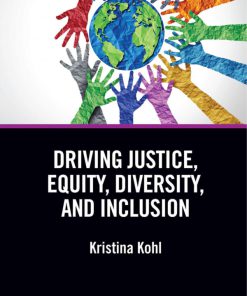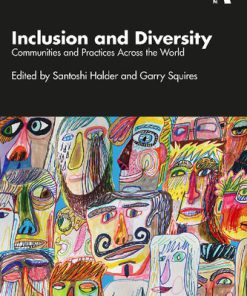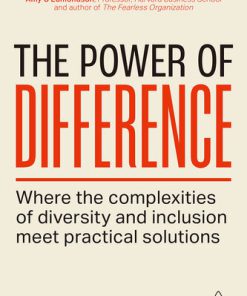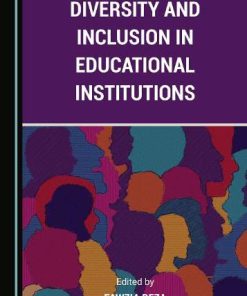Diversity Inclusion and Decolonization 1st Edition by Abby Day, Lois Lee, Dave Thomas, James Spickard ISBN 9781529216646 1529216648
$50.00 Original price was: $50.00.$25.00Current price is: $25.00.
Diversity Inclusion and Decolonization 1st Edition by Abby Day, Lois Lee, Dave Thomas, James Spickard – Ebook PDF Instant Download/Delivery: 9781529216646 ,1529216648
Full download Diversity Inclusion and Decolonization 1st Edition after payment
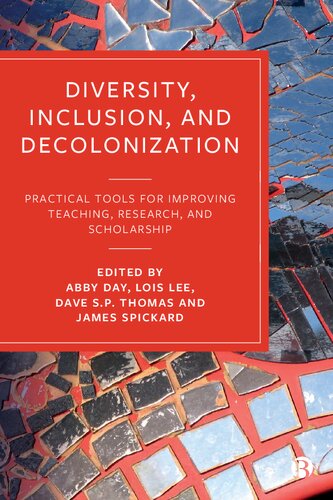
Product details:
ISBN 10: 1529216648
ISBN 13: 9781529216646
Author: Abby Day, Lois Lee, Dave Thomas, James Spickard
Scholars from the privileged classes of the Global North’s Western higher education institutions system still dominate the knowledge systems of the academy. Much is written about how things should change, but little about what has worked in practice. This book presents practical examples of efforts to diversify points of view, include previously excluded people, and decolonise curricula. What has worked? What hasn’t? What further visions do we need? How can we bring about a more democratic and just academic life for all?
Written by scholars from different disciplines, countries, and backgrounds, this book offers an internationally relevant, practical guide to ‘doing diversity’ in the social sciences and humanities and decolonising higher education as a whole.
Diversity Inclusion and Decolonization 1st Edition Table of contents:
Part I Changing Universities
1 Negotiating Diversity, a Personal Reflection
Introduction
1980s radicalism
1990s challenges
2000s managerialism
2010s intersectionality
Looking to the 2020s
2 Demystifying the ‘Decolonizing’ and ‘Diversity’ Slippage: Reflections from Sociology
Introduction: critiquing the decolonizing-diversity slippage
Three principles in decolonizing the curriculum
Decolonizing knowledge and the attack on Eurocentrism
Decolonizing is a relational process
Justice against epistemicide
Concluding thoughts and practical reflections: a world beyond diversity, inclusion, and equality
Notes
References
3 Doing Diversity Inclusively: ‘East Asians’ in Western Universities
Introduction
Racialized ‘East Asian’ students in postcolonial Britain
The culturalist origin of European racism
Chinese beliefs and Christian inclusivity: UK-based study
Conclusion
Notes
References
4 This Island’s Mine: University Teaching as Inclusive Dramaturgy
Prologue: setting the scene
Act One: What is the managerialist-adjustment model?
Act Two: What if theory were taught using the principles of inclusive dramaturgy?
Returning to the studio
Act Three: What next? Being realistic in changing university teaching
References
5 Emergent Tensions in Diversity and Inclusion Work in Universities: Reflections on Policy and Practice
Introduction
The promises and contradictions of diversity and inclusion work in universities
The inclusivity workshop
Workshop reflections
Question 1: Who does the work?
Question 2: What work needs to be done?
Question 3: How do we do the work?
Conclusions
References
Part II Diversifying Curricula
6 How ‘Diverse’ is Your Reading List? Tools, Tips, and Challenges
Introduction: The shifting context for curriculum reform in the United Kingdom
A social science case study and four toolkits
Ten tips for reviewing the authors on reading lists
1 Use theoretical tools
2. Engage students
3. Engage staff
4 Be reflexive
5 Seek resources
6. Determine which author characteristics are salient
7. Collect and manage data
8 Analyse data
9 Consider ethical issues
10 Get started …
References
7 Pluralised Realities: Reviewing Reading Lists to Make Them More Culturally Sensitive
Introduction
The project
Epistemic racism/sexism and Whiteness
Theorising race, gender, and intersectionality in relation to ‘authentic knowledge’
Conclusion
References
8 Decolonizing Research Methods: Practices, Challenges, and Opportunities
Introduction
Motivations and origins
Pedagogy and praxis
Affect and co-production
Encouraging and embedding decolonial critique
‘Liberate our Library’
Conclusion
References
9 Towards an Intersectional Feminist Pedagogy of Gender-Based Violence
Introduction
Beyond resistance, towards inclusion
The intersectional nature of gender-based violence
Race, class, and gender-based violence
Sexuality and gender-based violence
Violence against men and the importance of intersectionality
Challenges in teaching a feminist intersectional account of gender-based violence
Individualising
Othering
Complexity, depth, and time
Principles for an intersectional feminist approach to gender-based violence
Model positive diversity
Focus on structure
Remember privilege
Make a sustained commitment
Create a supportive environment
References
Part III Diversifying Research and Scholarship
10 How Would a World Sociology Think? Towards Intellectual Inclusion
A Confucian sociology of the sacred
Tribes and cities: a view from 14th-century North Africa
The point
Notes
References
11 Whom We Cite: A Reflection on the Limits and Potentials of Critical Citation Practices
Introduction
Why we need to talk about citations
Contributions of measurement tools to the status quo
Citation practices and citation choices: consequences for the status quo
Active resistance and citation awareness
Critical citation practices
Power to local communities: indigenous methodologies and participatory research
What does that mean for scholars in lower power positions?
What does that mean for organizations in power?
Conclusion
Note
References
12 Scholarship in a Globalized World
Publishing as an arm for profit
The global impacts of prestige regimes
Leveraging intellectual capital to transform scholarly publishing
Reflect on where and how intellectual capital is invested
Reclaim the tenets of excellence and terms of assessment
Foster bibliodiversity
Limit publisher monopolies on content
Protest exploitative uses of monopolies
Divest funding from the oligopoly
Publishing as a relational practice
Notes
References
Part IV Overcoming Intellectual Colonialism
13 Dealing with the Westernisation of Chinese Higher Education: Evidence from a Social Science Department
Introduction
Some historical notes on the Westernisation of Chinese sociology
Dealing with the Westernisation of social theory in teaching
Further actions to de-Westernise sociology
Conclusion
Notes
References
14 Opportunities and Challenges in Integrating Indigenous Peoples and Cultural Diversity in International Studies
Introduction
American model of education in postcolonial Philippines
International studies in the Philippines programs
Peoples and cultures of the Philippines
Literature and resources on IPs of the Philippines
Instructional and classroom activities
Conclusion
References
15 Decolonial Praxis beyond the Classroom: Reflecting on Race and Violence
Introduction
BlackSundaysSalon: learning together outside the classroom
Curating race and violence
Prisoners’ Memorial
Public Sculpture
Decolonial love and eating as decolonial praxis
Conclusion: curating violence
Notes
References
Epilogue: What We Have Learned
What needs to change?
How can change happen?
Note
References
Index
People also search for Diversity Inclusion and Decolonization 1st Edition:
pde equity and inclusion toolkit
pde diversity equity and inclusion
inclusion diversity and equity topics
incorporating diversity equity and inclusion (dei) into research
is decolonization possible
Tags: Abby Day, Lois Lee, Dave Thomas, James Spickard, Diversity Inclusion, Decolonization
You may also like…
Politics & Philosophy - Government & Politics
Driving Justice, Equality, Diversity, and Inclusion Kristina Kohl
Reference - Thesauri
How to Get Published and Win Research Funding 1st Edition by Abby Day 1032195444 9781003259718
Uncategorized
Inclusion and Diversity Communities and Practices Across the World 1st Edition Santoshi Halder
Uncategorized
Improving Teaching and Learning through Internationalisation 1st Edition Betty Mcdonald
Education Studies & Teaching - School Education & Teaching
Education Studies & Teaching - Special Education
Diversity and Inclusion in Educational Institutions 1st Edition Fawzia Reza



